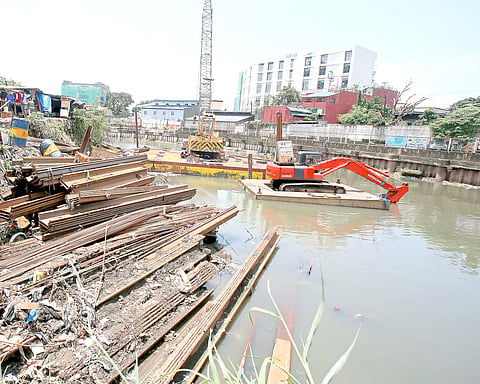
- NEWS
- the EDIT
- COMMENTARY
- BUSINESS
- LIFE
- SHOW
- ACTION
- GLOBAL GOALS
- SNAPS
- DYARYO TIRADA
- MORE

Billions are poured into public works every year. Roads, bridges, dikes and canals should be proof of taxpayer money at work. Yet what do Filipinos see? Crumbling flood walls, unfinished canals, and projects that collapse after a single storm. It is no surprise allegations of “ghost projects” and padded costs are hounding the Department of Public Works and Highways (DPWH).
In a sit-down with DAILY TRIBUNE, several DPWH engineers — speaking on condition of anonymity for fear of reprisals — confirmed what many already suspected: the very safeguards meant to stop corruption were being bent, bought, and bypassed.
“There are really many layers of an audit,” one engineer said. “There’s CoA for financial and compliance, there’s an internal audit, there’s a quality audit. But on the ground, it’s easy to fix things.”
Another NCR-based engineer went further, saying that even auditors were on the take.
“It’s the district engineer himself who gives the money. The minimum is P50,000, but it can reach P300,000 depending on the audit,” he said. “So if the DPWH investigates itself, it’s almost laughable. Nothing will happen.”
Instead of serving as a check, audits have become avenues for extortion. Projects that should fail inspection are signed off as “compliant” once cash changes hands.
And the corruption, they said, begins long before the first shovel breaks the ground.
“If there’s a favored contractor — let’s say ABC Construction backed by a district engineer or congressman — they’re guaranteed the win,” one engineer explained.
Other companies are brought in as “props” to make the bidding look competitive. Behind the scenes, the favored contractor has already paid off the Bids and Awards Committee (BAC) and even its supposed rivals.
“They’re paid off not to lower their prices. So even if there’s a bidding, it’s scripted. The people are the ones who lose,” the engineer said.
The payoff keeps the contract price near the Approved Budget for the Contract (ABC). The losing bidders still pocket “cooperation” money. The district engineers and politicians take their cut.
“Whoever endorsed the contract also gets a share,” another engineer said.
Actually, the DPWH has a thick rule book meant to prevent anomalies. There are project monitoring apps, audit systems, contractor ratings, and inspection units — all designed as safeguards. But in practice, each one can be gamed.
The Project and Contract Management App (PCMA) is supposed to track milestones, spending, and completion status — but false updates can be uploaded without checks.
The Document Tracking System (DoTS) should prevent fake paperwork, but bogus documents still pass. The Constructors’ Performance Evaluation System (CPES) is meant to disqualify poor performers, but inflated ratings let violators win again. Internal quality auditors can be bribed.
Variation orders meant to justify added costs are rubber-stamped. Procurement audits turn into staged shows with dummy bidders. And Quality Assurance Units often skip site visits altogether.
“These are written in the manuals, covered by department orders,” one engineer said. “If you follow them, it’s hard to cheat. But if everyone can be bought, what’s the point?”
The cost is massive. A P50-million flood control project may deliver only P35 million worth of actual work — the rest lost to bribes and kickbacks. And the damage is real: a farmer’s harvest ruined because a dike slumped, a family wading through floodwater from an unfinished canal, taxpayers funding steel reinforcements that were never installed.
“The rules are not lacking,” the engineer said. “What’s lacking is the courage to enforce them. If even the auditors can be bought, and the bidding is rigged from the start, then the fight is over.”
The DPWH does not lack for safeguards. They’re on paper, neatly filed in manuals and department orders. But when audits can be bought and bids are scripted, ghost projects don’t just sneak in — they’re built into the system.
(To be continued)
Editor’s Note:
This explainer is part of DAILY TRIBUNE’s continuing coverage of infrastructure accountability. The engineers interviewed requested anonymity out of fear of retaliation. Their claims, including allegations of bribery and rigged procurement, remain unverified in court and have been included for transparency. DAILY TRIBUNE has reached out to the DPWH for comment and will update this story once a response is received.
